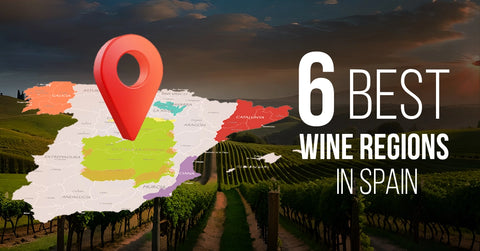There is something about French wine that keeps us going back to it all the time. It feels like a glass of the same tells a story every time it collides with our senses.
In 2023, France even topped the list of global wine production. But what is it that makes it a sweetheart? Exactly why are French wine grapes so special? Let's figure out.
Why Are French Wine Grapes So Special?
Of course, every grape resonates with the region it comes from but in the case of French wine grapes, it goes beyond just the area but also the climate and landscapes, legacy, culture, and what you did not expect, uncertainty.
-
Terroir
The cornerstone of the excellence of French wine grapes lies in terroir. Terroir encompasses the intricate interplay of environmental factors like soil composition, climate, topography, and even the local microbial life, all of which play a crucial role in shaping the character of the grapes, and ultimately, the wine.
Understand it this way: two vineyards in France, each planted with Cabernet Sauvignon vines. Yet, the resulting wines might taste entirely different. Why? Terroir. Perhaps one vineyard basks in the warm sunshine of southern France, and the other one, nestled in a cooler northern region.
Unlike some in the "New World," French winemakers embrace this uncertainty. They view themselves as stewards of the land, working with nature rather than against it. This philosophy translates into minimal intervention winemaking practices, allowing the unique voice of each terroir to shine through in the final product. The result? Wines made of French grapes are a testament to their specific place of origin.

-
Climates and Landscapes
France boasts a remarkably diverse geographical spread, stretching from the cool, maritime-influenced regions in the north to the sun-drenched Mediterranean vineyards in the south. This translates into a dazzling array of climates that allows for the cultivation of a wide variety of grape varieties.
Travel north to regions like Alsace and Burgundy, where Riesling and Pinot Noir grapes flourish in cooler temperatures, producing wines known for their elegance and bright acidity. Head south to the Rhône Valley, where Grenache and Syrah grapes bask in the warmth, resulting in wines that are bold, structured, and bursting with ripe fruit flavors.
The varied topography adds another layer of complexity. Take, for instance, the legendary Châteauneuf-du-Pape region. Here, the vineyards sprawl across a landscape of ancient, rounded pebbles, known as galets. These pebbles absorb the sun's warmth during the day, radiating it back to the vines at night.

-
A Legacy Etched in Time
The story of French wine grapes is one steeped in history. Viticulture, the cultivation of grapes, dates back over 2,000 years in France. Imagine the countless generations of winemakers who have meticulously tended these vines, their knowledge and techniques passed down through time like a precious heirloom.
This rich history has resulted in a deep understanding of grape varietals and the specific terroirs that best suit them. French winemakers are masters at coaxing exceptional quality from their grapes, a testament to the accumulated wisdom gleaned over centuries.

-
Culture
Wine isn't just a beverage in France; it's woven into the very fabric of their culture and cuisine. Meals are savored slowly, with each sip of wine carefully chosen to complement the flavors of the food. It's a social lubricant, bringing people together for lively conversation and shared experiences.
Unlike some "New World" wines that might be designed for immediate enjoyment, French wines are often built for aging. They evolve over time, revealing new layers of complexity with each passing year. This focus on longevity reflects the deep respect the French have for tradition and the belief that truly great wines are meant to be savored, not rushed.

-
Uncertainty
There's a certain romanticism associated with French winemaking. Unlike some industrial, highly controlled approaches, French winemakers often embrace a more intuitive, hands-off method. They rely on their honed senses and experience to guide crucial decisions, such as the perfect time to harvest the grapes.
This acceptance of nature's unpredictability leads to a fascinating combination between the winemaker and the elements. A particularly warm summer might mean slightly riper grapes, resulting in a wine with a touch more power and richness. A cooler, wetter year might yield grapes with higher acidity, making for a more elegant and restrained style.
French winemakers understand that sometimes, the most exquisite wines are born from embracing the unexpected, allowing the whispers of the land to guide their craft.

Summing up, if you keep choosing French wine again and again, it's not just you, they indeed are special. Writing this article called us to open a bottle of Merlot. If you too feel the same, head on to Benchmark Wines now!



